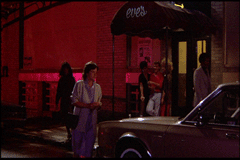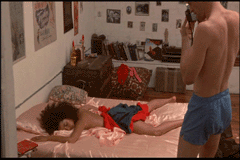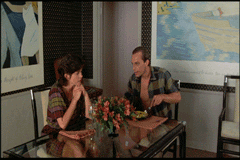Choose Me (Alan Rudolph) 1984
 Alan Rudolph’s Choose Me is a wonderful,
exceptionally original film. With a close-knit cast that is comprised of an
ex-prostitute barkeep (Lesley Ann Warren), an escaped mental patient who is a
pathological liar (Keith Carradine), and a radio talk show sex therapist
(Genevieve Bujold), among others, the film bemusedly asks the old joke: what
happens when a group like this enters a bar? The resulting film is constantly
wavering between being a romantic comedy and a film noir drama. That
uncertainty, combined with the film’s sets (which are obviously sets) and the
definite rhythms (reinforced by the ever present Teddy Pendergrass soundtrack),
makes the film feel like a mass delusion. This is appropriate, since the
film’s message is that we shouldn’t look to others to find out how to live
our love lives, and this is a thoroughly romantic movie. Appropriately, it
closes with a perfect moment of apprehension that suggests the fragility of that
message and questions the sureness of the film’s resolution.
Alan Rudolph’s Choose Me is a wonderful,
exceptionally original film. With a close-knit cast that is comprised of an
ex-prostitute barkeep (Lesley Ann Warren), an escaped mental patient who is a
pathological liar (Keith Carradine), and a radio talk show sex therapist
(Genevieve Bujold), among others, the film bemusedly asks the old joke: what
happens when a group like this enters a bar? The resulting film is constantly
wavering between being a romantic comedy and a film noir drama. That
uncertainty, combined with the film’s sets (which are obviously sets) and the
definite rhythms (reinforced by the ever present Teddy Pendergrass soundtrack),
makes the film feel like a mass delusion. This is appropriate, since the
film’s message is that we shouldn’t look to others to find out how to live
our love lives, and this is a thoroughly romantic movie. Appropriately, it
closes with a perfect moment of apprehension that suggests the fragility of that
message and questions the sureness of the film’s resolution.
 What distinguishes the film from so many romantic comedies
is that the film’s characters have been around the block a few times. They all
have distinct baggage that colors their approach to love. Eve (Warren) as an
ex-streetwalker doesn’t want to get involved with yet another man, since she
seems to attract the wrong sort, and doesn’t seem that changing. Mickey (Carradine)
has the opposite problem. He claims he doesn’t kiss women that he doesn’t
intend to marry, and ultimately ends up breaking a lot of hearts, since he’s
hardly selective about whom he kisses. All of these characters feel richly
sketched, because they are busy worrying how their relationship will be
perceived by others, what it’s “supposed to be”, if they will be who the
other person wants them to be, and if they are feeling the right things, rather
than whether or not they’re happy. These neuroses are caused by a world that
offers up plenty of suggestions and expectations about what love should be
(films, psychotherapy, self-help, and prostitutes are only a some of the
movie’s examples) but few answers.
What distinguishes the film from so many romantic comedies
is that the film’s characters have been around the block a few times. They all
have distinct baggage that colors their approach to love. Eve (Warren) as an
ex-streetwalker doesn’t want to get involved with yet another man, since she
seems to attract the wrong sort, and doesn’t seem that changing. Mickey (Carradine)
has the opposite problem. He claims he doesn’t kiss women that he doesn’t
intend to marry, and ultimately ends up breaking a lot of hearts, since he’s
hardly selective about whom he kisses. All of these characters feel richly
sketched, because they are busy worrying how their relationship will be
perceived by others, what it’s “supposed to be”, if they will be who the
other person wants them to be, and if they are feeling the right things, rather
than whether or not they’re happy. These neuroses are caused by a world that
offers up plenty of suggestions and expectations about what love should be
(films, psychotherapy, self-help, and prostitutes are only a some of the
movie’s examples) but few answers.
 The masterful thing about Choose Me is that it never
for a moment feels forced. Every bit of quirkiness is allowed to flower enough
to register, but never feels so odd that it distracts from the film’s
emotional core. Rudolph’s script walks a real tightrope throughout the film,
but somehow maintains an easygoing grace. He builds a distinctive world here
without shutting out reality entirely, and as a result creates a film that feels
strangely self-aware that it’s breaking its own rules. The fantastic
ensemble’s general understatement helps a lot in keeping this from all boiling
over into kitsch. They create characters that are understandably eager to
connect with another person, despite their awareness of their inadequacies, and
that willingness to be open makes them thoroughly endearing. Films that let us
get in close with characters, see their faults, and then end up loving them
despite them are way too rare, so it’s unfortunate that Choose Me seems
to be rather underappreciated. Though the film’s hairstyles and costumes might
have dated a bit since 1984, its mixture of intelligence and sentiment hasn’t
dated at all.
The masterful thing about Choose Me is that it never
for a moment feels forced. Every bit of quirkiness is allowed to flower enough
to register, but never feels so odd that it distracts from the film’s
emotional core. Rudolph’s script walks a real tightrope throughout the film,
but somehow maintains an easygoing grace. He builds a distinctive world here
without shutting out reality entirely, and as a result creates a film that feels
strangely self-aware that it’s breaking its own rules. The fantastic
ensemble’s general understatement helps a lot in keeping this from all boiling
over into kitsch. They create characters that are understandably eager to
connect with another person, despite their awareness of their inadequacies, and
that willingness to be open makes them thoroughly endearing. Films that let us
get in close with characters, see their faults, and then end up loving them
despite them are way too rare, so it’s unfortunate that Choose Me seems
to be rather underappreciated. Though the film’s hairstyles and costumes might
have dated a bit since 1984, its mixture of intelligence and sentiment hasn’t
dated at all.
* * * *
Jeremy Heilman
12-16-01